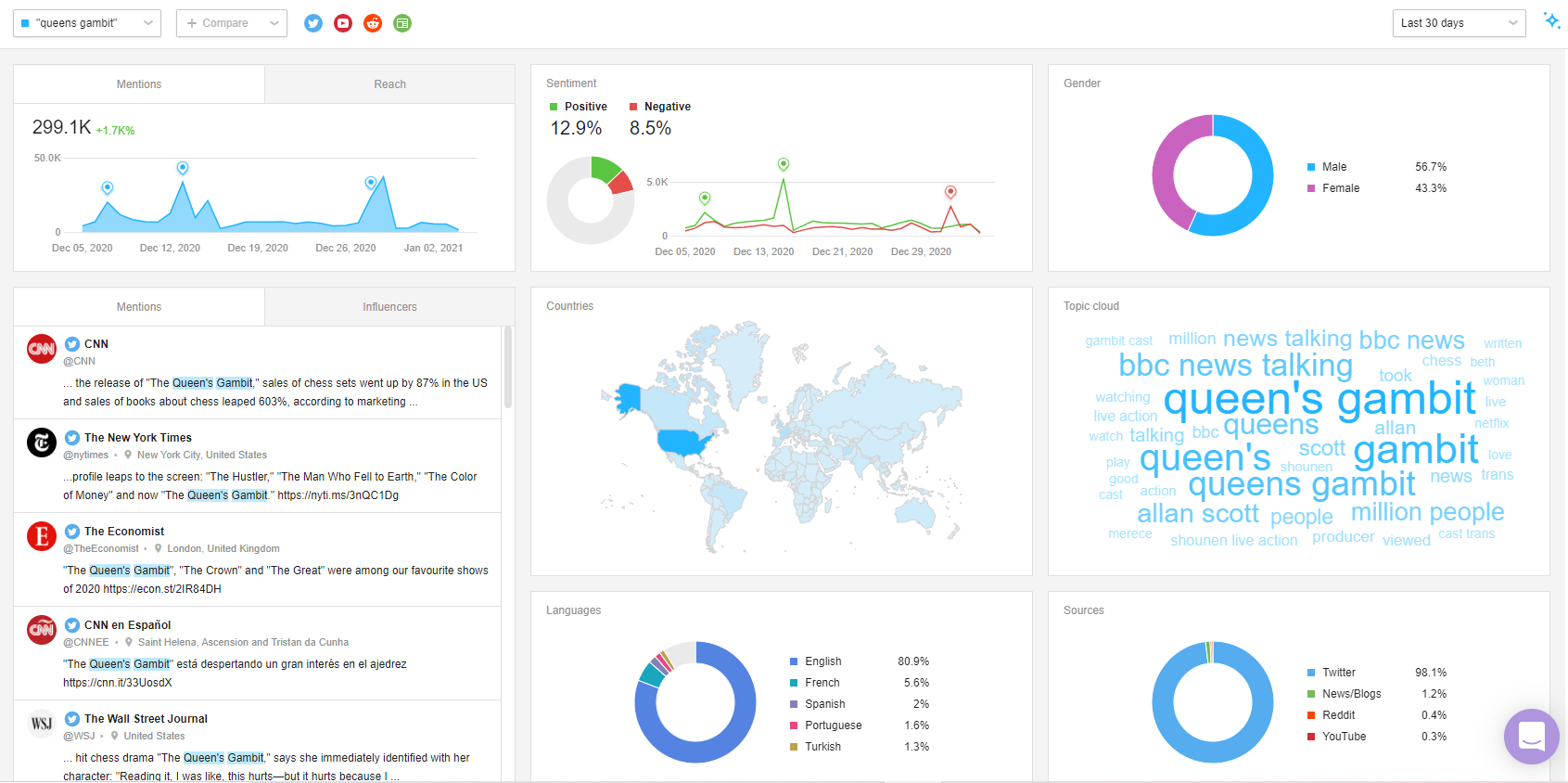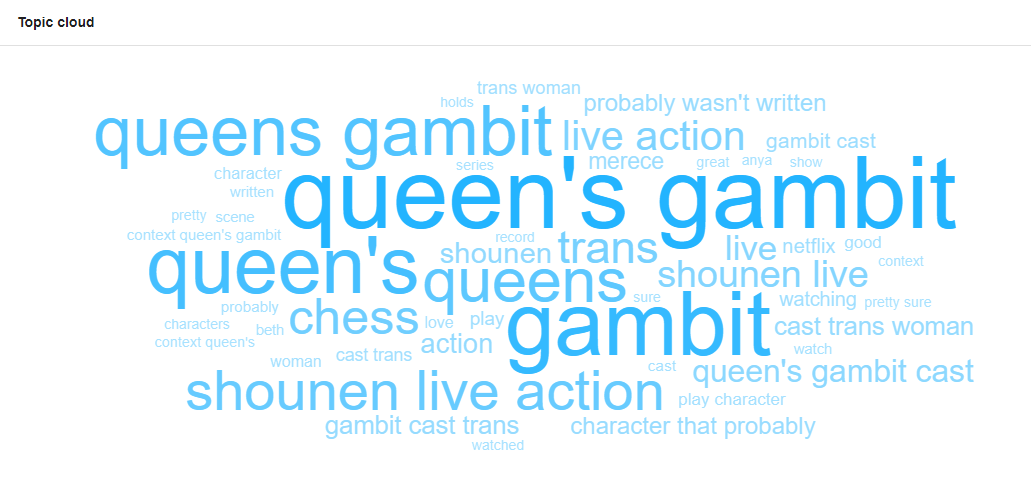The Queen's Gambit: social media study

The Queen’s Gambit has been one of the most successful series in 2020 (and incidentally, one of the rare good things that have happened to me in the same period of time).
Unexpectedly, the coming-of-age story of a young chess prodigy, Beth Harmon, becoming a world champion caught the hearts and minds of millions of viewers. Netflix reported The Queen’s Gambit to be its biggest limited series yet. It was watched by 62 million households worldwide in its first 28 days and resulted in what was immediately called “The Netflix effect”.
“The Netflix effect” was a summary of the following events:
- The Queen’s Gambit novel is now on The New York Times bestseller list - 37 years after its release.
- Google search queries for chess have doubled while searches for “how to play chess” have hit a nine-year peak.
- Inquiries for ‘chess sets’ on eBay are up 250% and Goliath Games says its chess sales have increased over 170%.
- The number of new players has increased fivefold on chess.com.
Here at Awario, we decided to analyze the Internet's reaction to The Queen’s Gambit and look at the factors that people liked and disliked about the series.
By signing up I agree to the Terms of Use and Privacy Policy
Unlike, for example, the popular horror movie IT, The Queen’s Gambit didn’t have a social media marketing strategy. Netflix barely mentions the series' release on the streaming service's official accounts and only really gives the series the attention it deserves after it goes viral.
Seems like no one, even the creators themselves, has predicted or planned the success of The Queen’s Gambit. Multiple analysts have pointed out the main factors for it - the escapism it provides, the fairy-tail type of story, the amazing acting of Anya-Taylor Joy, the absolutely fabulous costume design, and so on. While this is all true, the Awario tool and I decided to go further. We've analyzed the Internet buzz around the series to see the overall stats and derive the factors that Internet users named when talking about the series.
To do that, I’ve monitored “The Queen’s Gambit” as one keyword for 30 days across major social media platforms, news sites, blogs, and forums.
Here's how the Dashboard for The Queen's Gambit looks:

Social listening analytics for 'The Queen's Gambit': summarized
Growth and sentiment statistics
The series was obviously a word-of-mouth success. 'The Queen's Gambit' gathered almost 230 thousand mentions in 30 days, and this number keeps growing. There were almost twice more positive mentions than negative ones, however, most mentions were neutral. The majority of the reposted mentions offered a description of the series as opposed to praise or criticism. Some of the most viral posts referred to The Queen's Gambit as a well-known classic as if the assessment is simply not necessary.
queen's gambit but for tetris
— hbomberguy (@Hbomberguy) December 28, 2020
Influencers
The influential media accounts for the series included CNN, the Economist, Forbes, The Ellen Show, MsMojo, Buzzfeed, and plenty of other news sources and cultural sources.
The most influential authors who have mentioned The Queen's Gambit in the past 30 days have been Chris Sacca with 1.6 million followers, Jason Goldman with almost a million followers, and @dakotaz with 1.6 million followers.
what's a good netflix show and please don't say the queens gambit
— dakotaz (@dakotaz) December 7, 2020
Influential accounts have surely boosted the views for The Queen's Gambit. It's important that they appeared after the show was released and still talk about it a lot. While it could be that the hype would go down after a while, influencers keep it up almost two months after the release date.
The Topic Cloud
The Topic Cloud for the series presents the topics and keywords that came up most often in the last 30 days.

We can see some obvious topics: "chess", "queen's gambit cast", "anya", "character", "netflix", etc. We can also see keywords that signal the positive attitude for the series: "love", "good", "great", "watch". But the ones that have surely caught your attention were the two main topics that were widely discussed on the Internet in the past 30 days.
"Shounen live action" refers to the debate that's been going on (mostly on Reddit) that The Queen's Gambit is a live-action anime shounen, which is a commonly made anime genre. I'll save you some Googling time, most people don't agree with this.
The second topic that pops up in a topic cloud is "trans", which refers to the fact that the series stars Rebecca Root, a transgender actress who plays Miss Lonsdale, the choir teacher at the main character's orphanage. She stars there as a cisgendered female, which was applauded by the social media audience.
Queen’s Gambit cast a trans woman to play a character that probably wasn’t written as trans in the script and was just like, a lady doing a job and living her life. i do not see bollywood ever get to that level.
— yourdaddy (@yourdaddyzurie) December 7, 2020
What did people like about The Queen's Gambit?
I've analyzed positive mentions of The Queen's Gambit and discovered nothing too surprising about the factors that people pointed out about the series. The most mentioned good things about the series were: Anya-Tailor Joy, her acting, and her beauty; chess; mid-century set; soundtrack; writing; camera work; and "the men of Queen's Gambit".
Out of this list, the only thing that surprised me was the love of chess that many people apparently always had. Social media users were quick to point out that they know and like chess, have played as a kid, or find the game fascinating. Seems like it wasn't just that The Queen's Gambit made chess hot, but also the other way round. At least, to some extent.
Thanks to The Queen’s Gambit, we can now say things like “You’ve never played chess?” when all we actually did was watch a TV show pic.twitter.com/yB0OM5G5Kw
— Netflix (@netflix) November 25, 2020
What did people dislike about The Queen's Gambit?
The Queen's Gambit faces few criticisms on social media, news sites, blogs, and forums. Awario calculated 8,2% of negative mentions, but even out of those many are mistakenly flagged as negative because of people's complaints that they want to play chess now/can't stop playing chess.
Real negative comments point out that no woman has ever won or even came close to winning a world chess championship and Anya Taylor-Joy's lack of previous chess experience. Some negative comments also showed the refusal to google the meaning of the "queen's gambit" and the overall disbelief and dislike of the story that some viewers felt.
I’ve just started Queen’s Gambit and it’s a pity a girl who learns chess through the hallucinations brought about by drugs? Wtf?
— Julia Ioffe (@juliaioffe) December 28, 2020
I literally do not know what the queen’s gambit is and I do not want to know
— beans after dark after dark (@goodbeanaltalt) December 7, 2020
Some were also genuinely confused about their feelings. These mentions were also flagged as negative. The tweet below shows how hard it can be for the machine (and for a human, to be fair!) to decide if the opinion is negative, positive, or neutral.
Finished Queen’s Gambit. Beautiful filmmaking. Although I didn’t love it. Never liked Beth (character, not actor). But wow, beautifully done!
— Tricia Helfer (@trutriciahelfer) December 15, 2020
As marketers and product owners, this study of negative reactions to The Queen's Gambit teaches us that:
- You can't please everyone.
-
Digging deeper into negative mentions is essential to see the context of possible negativity.
Netflix's social media marketing reaction to The Queen's Gambit success
As I've noted before, Netflix didn't promote The Queen's Gambit before its release on October, 23rd. We saw a couple of trailers and a couple of social media posts, and that was it. The reasons for the series' immediate success had nothing to do with the marketing team of Netflix.
Did the streaming service do something after the series release to push the success even further, though?
The answer is "not really". Netflix made a couple of interviews with Anya Taylor-Joy, notably one with Judit Polgár, a world-renowned chess champion. Besides that, there was a couple of social media posts underlying the style and beauty of the series. Seems like Netflix's social media manager was allowed only one joke on the matter.
they never use any of my ideas... pic.twitter.com/gJTzo0bYkk
— Netflix (@netflix) December 1, 2020
I have to say, it's a good one.
Also, the Twitter channel of Netflix reposted compliments and jokes that came from other popular accounts. This is my favorite:
me calculating the tip on a $10 meal pic.twitter.com/qphoHO2emh
— Funny Or Die (@funnyordie) November 16, 2020
And in a very smart move, Netflix brand advocate decided to promote Peaky Blinders with the photos of Anya Taylor-Joy who is only in a couple of episodes.
If you need more @anyataylorjoy in exquisite period fashions, Peaky Blinders S5 is the move. pic.twitter.com/lzU4jI3Pvp
— Con Todo (@contodonetflix) November 25, 2020
You can also now see the face of The Queen's Gambit action in the snippet for Peaky Blinders on the Netflix website.
Other than that, Netflix is swimming in the pool of the series' success, leaving all the marketing to word-of-mouth. And rightfully so.
Conclusion
When your product is amazing and your brand already boasts awareness and an extensive user base, it's possible to leave marketing to the customers.
Word-of-mouth is more powerful than any marketing technique: people trust other people, not brands, and most of all they trust their family and friends who tend to love recommending and giving advice on what to wear, what to watch, and what to buy.
When your product is good, you can also trust that your brand advocates will appear out of nowhere and hop on the train. All you have to do then is monitor the buzz and see how your success is playing out.













